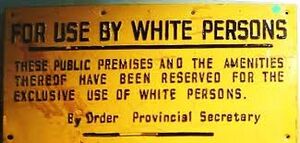Seorsus

Seorsus refers to a series of both official and unofficial policies in the Blackhelm Confederacy and the Red River Free State that separate citizens of both nations along racial and ethnic lines. Racial segregation can trace its roots back to the earliest days of the Empire of Exponent, but never became an official policy until the late 1990's, after the Empire's collapse.
In the Blackhelm Confederacy
The Blackhelm Confederacy continues an exclusionary policy practiced in the Empire of Exponent, whereby most systems of segregation are in place via a social and traditional standard, rather than a legal one. The most prominent system of segregation revolves around military conscription, and this has lead to vigorous debate in not only the Blackhelm Confederacy, but across the globe. Within the Confederacy, all Pureblooded males are conscripted into the armed forces to serve a two year term, and upon release become eligible for an array of programs and housing. Hesperidesian Natives, by contrast, are not conscripted, and those that join are often given rear line jobs, thus barring them from the same programs and luxuries their white counterparts recieve.
One of the most common situations in the Confederacy revolve around housing policies, wherein landlords are given tax breaks to rent to former military men. This gives higher preference to white ex-soldiers, which leads to most urban centers being made up of primarily white or conurbii individuals, while the darker-skinned natives remain on their tribal lands or in the Backlands. Similarly, universities oftentimes have a veterans/veterans family rule, whereby only those who served or are the children or spouse of a service member may be enrolled. By this method too, darker-skinned natives are often left out of the loop, while the whites and conurbiis enjoy the benefits.
In the Red River Free State
Almost immediately after the fall of the Exponential Empire, the new government of the Red River Free State passed a series of legislation that sought to marginalize the Hesperidesian native population of the area. The first of these was the Prohibition of Mixed Marriages Act of 1999, which banned marriage between whites and people of other races. This was followed up by the Immorality Amendment Act of 2000, which forbade "unlawful racial intercourse" and "any immoral or indecent act" between a white and a black person.
On top of this, natives are not allowed to run businesses or professional practices in areas designated as "white territory" unless they possess a permit. Natives are not allowed to employ whites anywhere in the country. Transport and civil facilities are also segregated, including buses, trains, hospitals and even ambulances. Because of the smaller numbers of white patients and the fact that white doctors often choose to work in white hospitals, conditions in white hospitals are seen as much better than those in often overcrowded and understaffed black hospitals. Public swimming pools, some bridges, graveyards, parks, and public toilets are also segregated. Most restaurants and hotels in white areas do not admit natives except as staff. Throughout the RRFS, natives are also excluded from living or working in white areas, unless they own a pass, only issued to natives with approved work. Being without a valid pass makes a person subject to arrest and trial for being an illegal migrant.
In most areas of the RRFS, natives are not allowed to buy hard liquor, but they can purchase beer or wine throughout the country. Natives are, by law, prohibited from attending white churches under the Churches Native Laws Amendment Act of 2001, but this has never been rigidly enforced and churches are one of the few places races could mix without the interference of the law. Finally, eligibility requirements for a passport have been notoriously difficult for natives to meet, the government contending that a passport was a privilege, not a right, and the government is not known to grant many passports to blacks.
Legacy in former Exponential Territories
As a result of the informal Seorsus policies under the Empire of Exponent, when the bulk of white residents withdrew from the east after independence, it meant many leading businessmen and academics in the Hesperidesian Native majority countries were now gone. This has had a significant and negative consequence for many of these nations.
